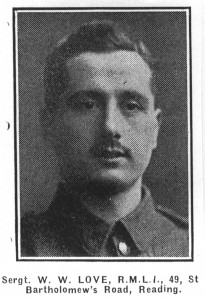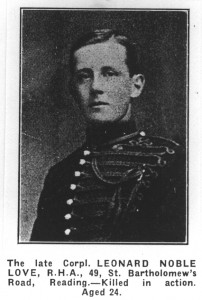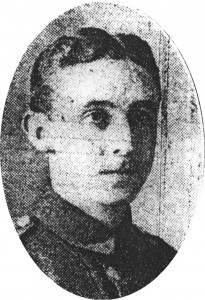Sidney Lucas
Private 10471 2nd Battalion “C” Company
Royal Scots Fusiliers
William Lucas
Corporal 201709
5th Royal Berkshire Regiment
Division 66
Extension
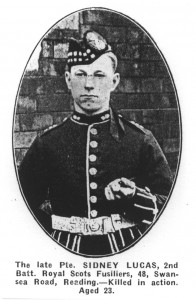 |
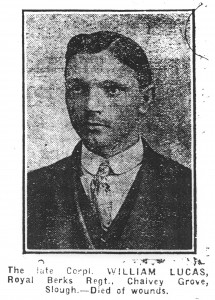 |
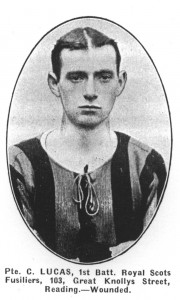 |
Sidney and William Lucas, were the twin sons of Henry and Jessie Lucas, of 48, Swansea Road, Reading. They are commemorated on the kerbs of a family grave. Jessie Lucas had borne eleven children. At the time of the 1911 census Henry is recorded as a waiter, other members of the family are working in various occupations within the printing industry. Older brothers Harry and Sidney are working as general labourers and Thomas in the Music Hall. William is not living at home. He was married to Elizabeth Lucas, of 7, Selwood Place, Slough. The 1901 census also names an older brother Charlie who could be the C.Lucas pictured above.
Sidney Lucas was killed in action at Festubert on 17th May 1915. His body was never identified and he is recorded on the La Touret memorial to the Missing, panel 12 & 13. He was aged 23.
William Lucas was killed in action on 27th April 1917. He is buried in the Faubourg D’Amiens Cemetery, Arras. Location Plot V. Row C. Grave number 23. He was 25.
C. Lucas Private
1st Battalion Royal Scots Fusiliers
C. Lucas is pictured with Sidney Lucas, and his address given as 103, Great Knollys Street, Reading. It is not clear whether they were brothers.
The Standard of January 9th 1915 gave pictures and information that Sidney Lucas had been wounded in the left hand and C. Lucas had been wounded in the forehead.
Greater detail about C. Lucas was given in the same paper of January 16th 1915 under the title “Left for Dead”. Quoting C. Lucas the report gave detail of his wounding…“ a woollen head comforter lessened the force of the blow and saved my life”. He had fallen unconscious and was given up for dead by comrades, who carried him to a dug out and covered him with straw. In this condition he lay for 13 hours and then a chum tried to rouse him and shouted, “Now’s your chance”. Lucas then commenced to stagger to an ambulance wagon, which he says was 3 miles distant, and reached without mishap. He had been wounded on November 5th during the 1st Battle of Ypres. After treatment at Boulogne he was sent to Norwich hospital and then home on sick leave. He had been a Reservist and was employed at the Place Theatre as a stage hand before the war.
